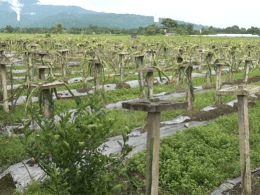In a significant boost to organic farming efforts, Tsirang District has inaugurated its seventh vermicompost plant in Tashiyangjong Chiwog under Kilkhorthang Gewog. The move marks a continued push by local authorities and farmers to reduce reliance on chemical fertilisers and promote environmentally friendly farming practices.
Renowned for its organic and high-quality produce, Tsirang has seen a growing number of farmers turning to sustainable farming methods. The new facility, which includes a vermiculture unit to breed and raise earthworms, is expected to produce approximately 10 metric tonnes of organic fertiliser annually.
Vermicompost, created through the natural decomposition of organic waste by earthworms, is gaining popularity for its superior ability to enrich soil and improve crop quality. Local farmer Birkha Bdr. Kharel, who manages the new plant, noted its effectiveness compared to traditional manure.
“Using just 600 kilograms of vermicompost in paddy fields has a greater impact than using 2,000 kilograms of cow dung,” he said. “The crops are more appealing, and consumers increasingly prefer produce grown with vermicompost.”
With rising demand for organic produce—especially in light of the upcoming Gelephu Mindfulness City—the Tsirang district administration aims to scale up production to 50 metric tonnes of vermicompost annually by 2028.
“Among the different types of organic manure, vermicompost is the most effective,” said Kinzang Chophel, Assistant District Agriculture Officer. “It not only enhances productivity but also enriches the soil with essential nutrients.”
The plant is part of a broader initiative supported by the Green Climate Fund (GCF), which has funded 70 percent of the project’s cost. The GCF is currently backing similar climate-resilient agriculture projects in eight districts across Bhutan.
Sherub Gyeltshen, Project Manager at GCF, highlighted the urgency of such initiatives in the face of climate change. “Temperature extremes and heavy rainfall are affecting soil health and nutrient retention. Projects like this are essential to maintaining productivity in an era of climate uncertainty.”
Tsirang Dzongda has encouraged farmers to take full advantage of such facilities and to intensify their organic farming efforts. He emphasized that such collective commitment will help Tsirang maintain and enhance its reputation as one of Bhutan’s leading organic farming districts.
As global and domestic markets increasingly favour organic produce, Tsirang’s continued investment in sustainable agriculture positions it at the forefront of Bhutan’s green farming movement.








